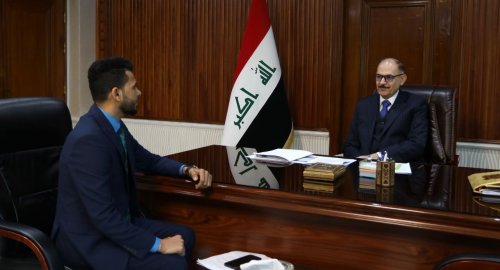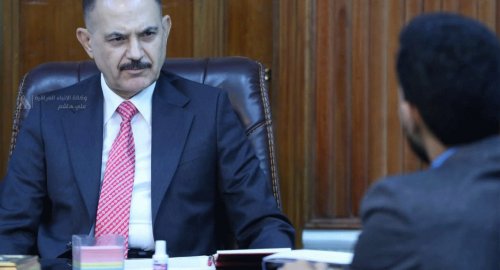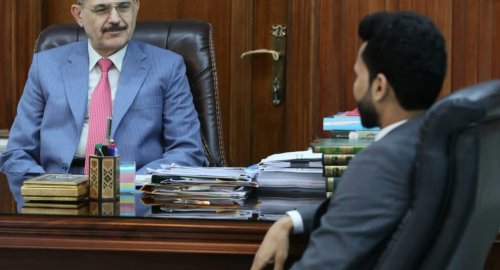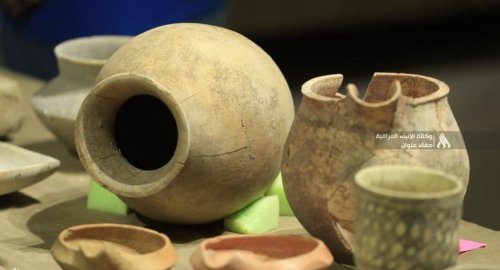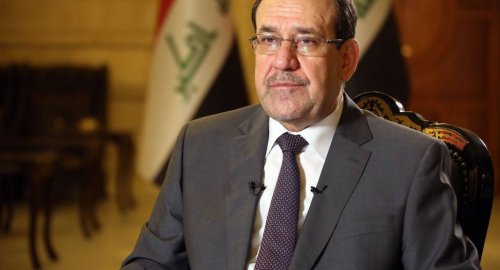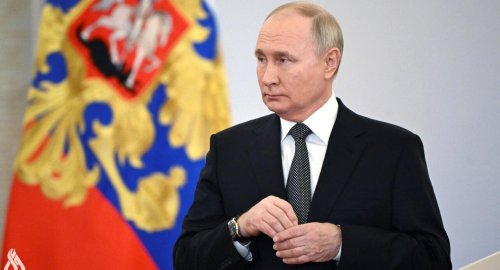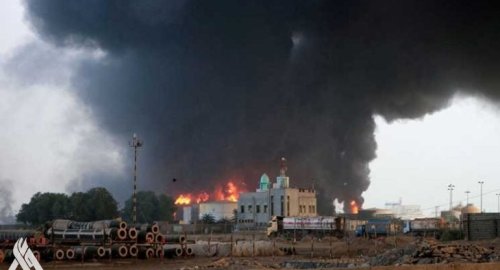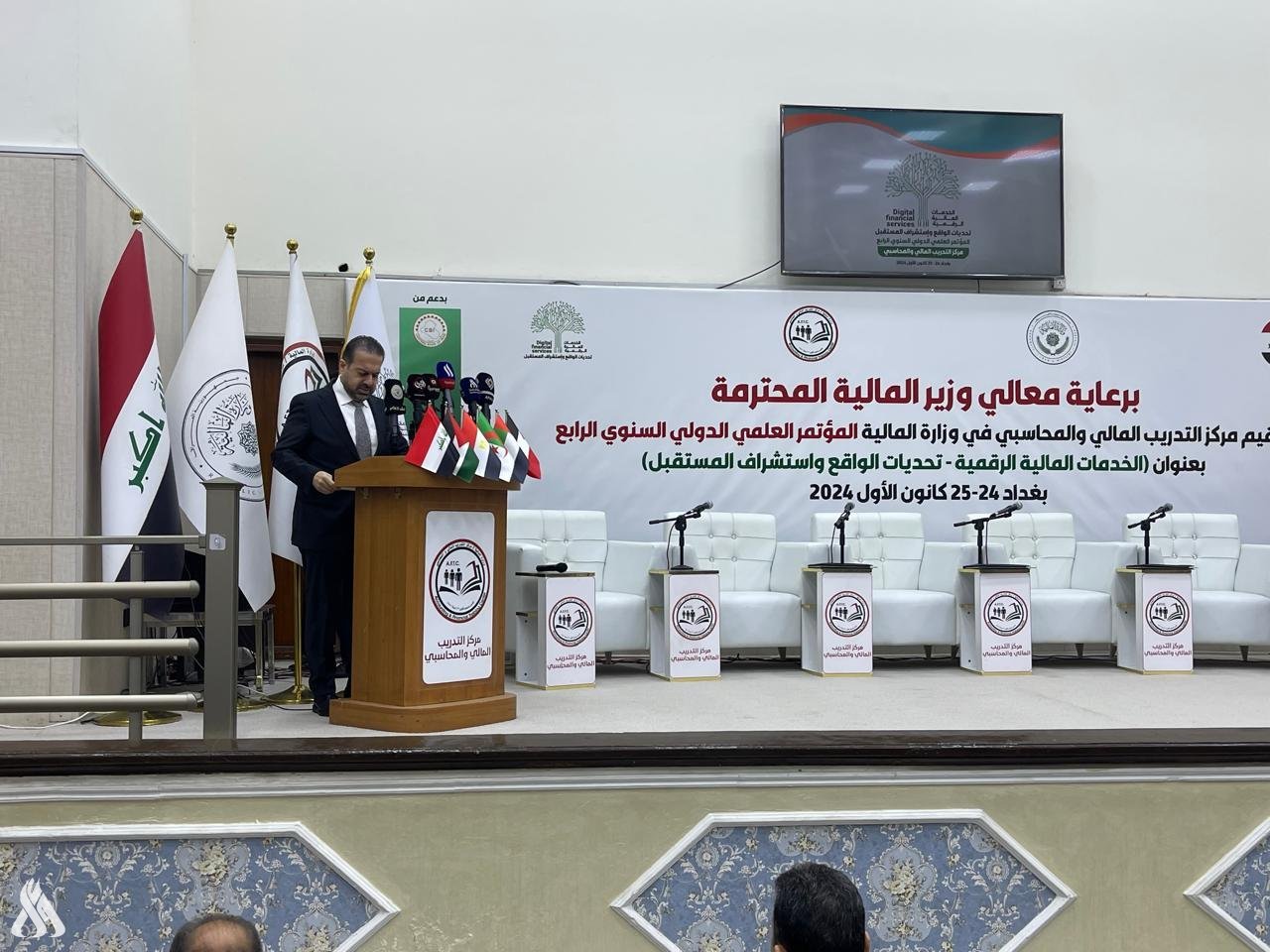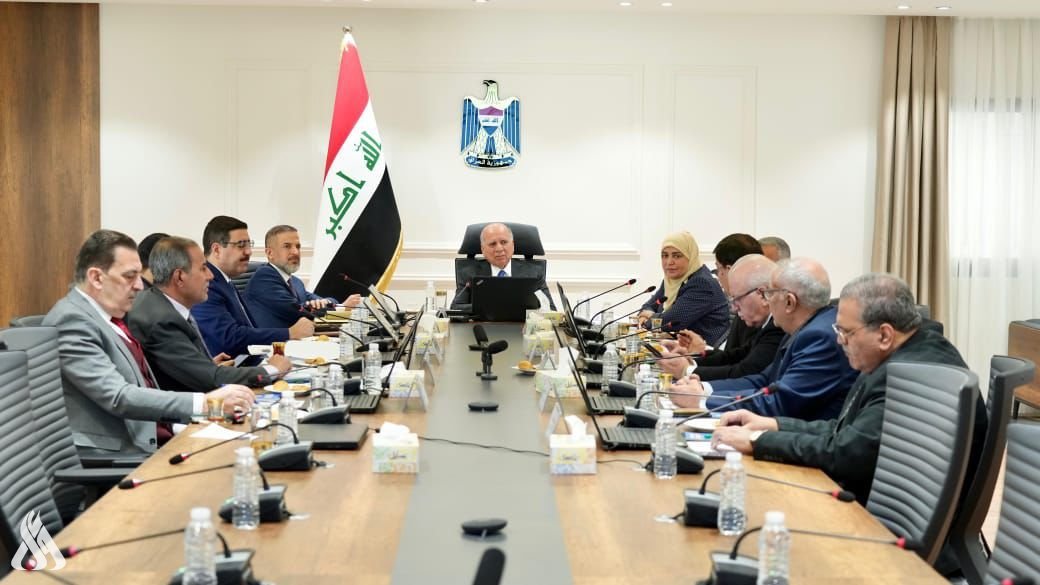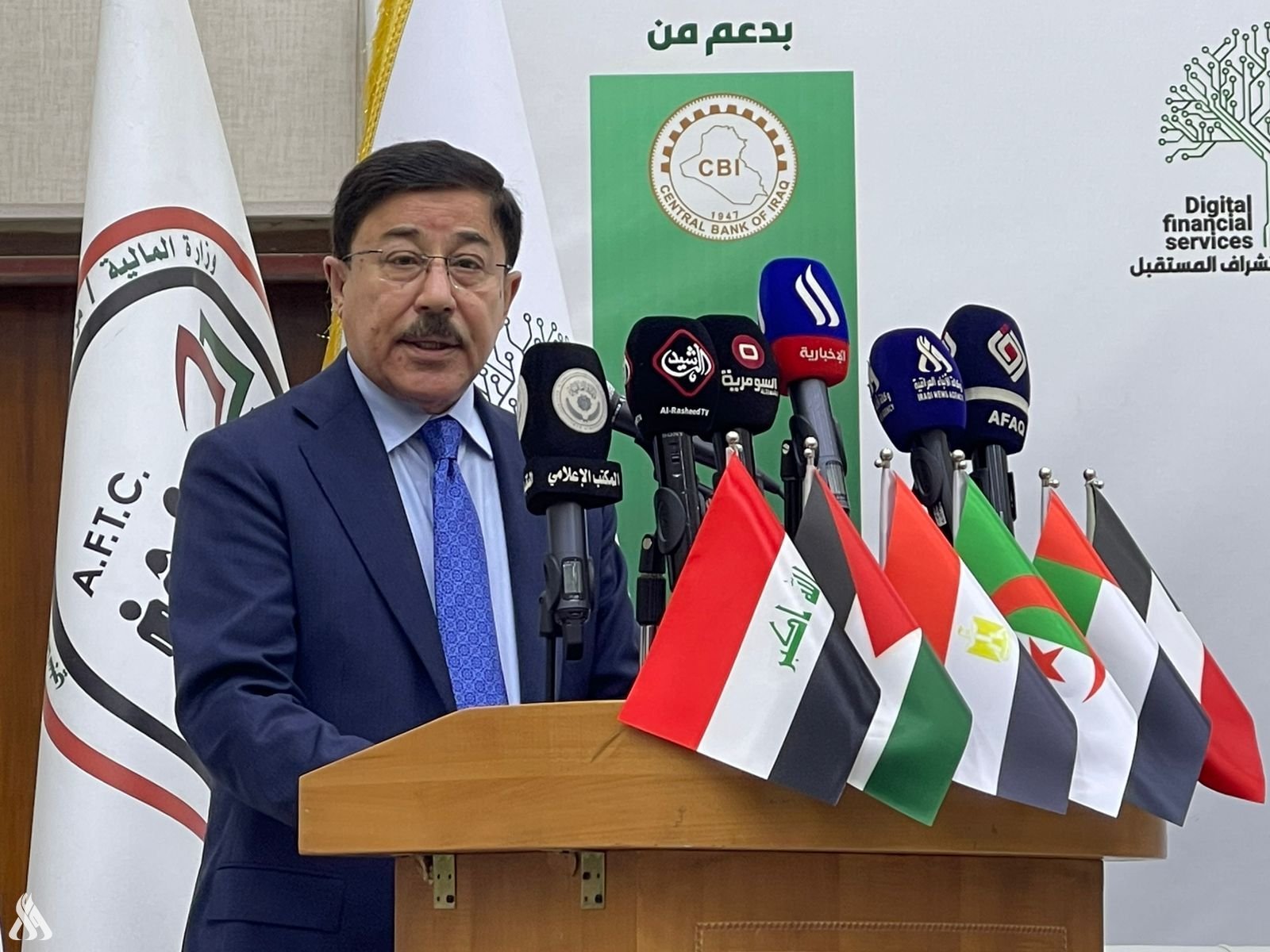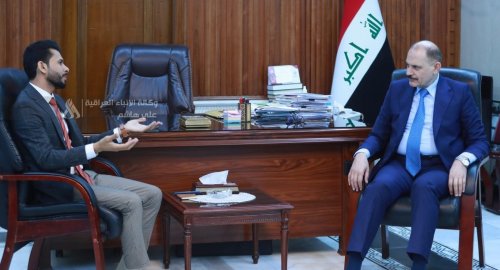
INA discusses several files with the President of FSC

- 5-03-2024, 13:27
Baghdad-INA
The President of the Federal Supreme Court FSC, Judge Jassim Al-Amiri, confirmed on Tuesday, the possibility of proceeding with the session to elect the Speaker of Parliament despite to lawsuit against the session. While he stated that the sub-districts in the Region could coordinate to settle the salaries of their employees, he pointed out that the Constitution established the court and defined its jurisdictions in accordance with Article 93 thereof.
Al-Amiri said in an interview with the Iraqi News Agency (INA), that " to legislate the Federal Council law, which the Constitution required the legislative authority, is considered a defect and a failure to respond to what the Constitution wants."
He added that " Parliament relies in its work on several standards, including those related to the members of Parliament, who represent the Iraqi people from north to south, which in turn represents the principles and values of the Iraqi people," noting that "the second framework under which Parliament works is the legislation of federal laws, while Parliament operates within the third framework, which represents the executive authority while its role operates within the fourth framework, which is to monitor the executive authority.
He stated that "the Iraqi people made great sacrifices in order to reach the stage which the state was built on democratic foundations "noting that "the Iraqi constitution was distinguished by defining the federal authorities and their powers and the rights and freedoms of the general public, as well as specifying the exclusive powers of the federal and irregular authorities of the region."
Al-Amiri stressed “the necessity of completing the presidency of Parliament from a constitutional and electing a new president to replace the previous president,” revealing that “electing a new speaker of Parliament does not depend on filing a lawsuit before the Federal Court or not, as that is due to the horizons and frameworks of the political parties, and the Non Electing the Speaker of Parliament does not mean suspending his work, but rather it will continue as usual until a new president is elected.”
He explained that "the invitation submitted before the Federal Court related to the session to elect the Speaker of Parliament, the court is examining it in accordance with the Constitution, but considering it does not mean that it is not possible to elect a new Speaker of Parliament."
He pointed out that "the file of re-nominating Shaalan Al-Karim for the presidency of Parliament is subject to what is decided by the parties that nominated him as for terminating his membership, the court will consider it at the time specified for it."
Regional employee salaries file
He pointed out that "the Federal Court decision that was issued obligated the Prime Minister of the Federal Government and the Prime Minister of the Regional Government to settle the salaries of employees, retirees and social protection beneficiaries with federal government banks and deduct them from the region's share specified in the budget law."
He continued, "The segments covered by the Federal Court's decision have proven that they did not receive their monthly salaries on a regular basis and on time therefore, problems between the federal government and the region due to non-implementation of budget items cannot be the main reason for depriving the region's citizens of their monthly salaries," pointing out that "the Federal Court In its decision, it indicated that the competent authority in coordination between the Ministry of Finance and the Ministry of Finance of the region is the Region’s Finance, but if the Ministry of Finance in the region objects to the implementation of the aforementioned decision, it is possible for the sub-departments to implement and coordinate directly with the Ministry of Finance in the government.
He stressed that "Iraq, under the parliamentary system, seeks to build democratic institutions and consolidate the principles of democracy, explaining that the first is the transfer of power, and the second is the transfer of wealth, since the transfer of power without the transfer of wealth is facing great harm to the Iraqi peopl if wealth is exchanged without power being transferred, we will be faced with a major tyranny.”
He stated that "the foundations of the democratic process are the peaceful transfer of power through the democratic and constitutional institutions stipulated in the Constitution, and the circulation of wealth among members of society," pointing out that "Article 111 of the Constitution stipulates that oil and gas are the property of all the Iraqi people, and the resulting wealth must be from oil and gas or from other sources for all the Iraqi people.”
He stressed: "It is not possible for an employee in the center and south to receive his monthly salary on time and meet all of his family's needs, while another employee in the Kurdistan region is deprived of that," explaining that "with this approach, equality will not be achieved and this leads to violating the constitution."
He pointed out that “the political process in Iraq must be built according to the principle of equality according to Article 14 of the Constitution, regardless of national and sectarian decline,” explaining that “among the basic principles on which the Constitution is based and on which the democratic process is based is equality before the law, and equality in rights and duties.”
He stressed "the importance of the federal government working in accordance with what was stated in the decision to implement all provisions of the aforementioned decision, considering that the decisions issued by the Federal Court and in accordance with Article 94 of the Constitution and Article 5 of the Federal Court Law are binding on all authorities."
Constitutional Court
He explained that “the Constitutional Court was established in accordance with the provisions of Article 92 of the Constitution, which stipulates that the Federal Court is a financially and administratively independent judicial body, and it was established in accordance with Federal Court Law No. 30 of 2005, as amended,” pointing out that “it is the Constitution that established this court and defined its powers in accordance with Article 93 of it, and therefore the establishment of the court came in implementation of a constitutional text, which gives the court its constitutionality.”
Constitutional texts about the regions
Al-Amiri stated that “Article 119 of the Constitution gave the right to each governorate or more to form a region based on a request for a referendum presented in two ways: the first, submitting a request from a third of the members in each of the governorate councils who want to form a region, and the second: submitting a request from a tenth of the voters from each governorate. that seek to form a region.
He added: “Therefore, the formation of regions is a constitutional right for every governorate, whether that governorate is affiliated with the region or outside the region, considering that the federal system in the Republic of Iraq consists of a capital, regions and governorates, decentralization and local administration,” indicating that “under Article 117 of the Constitution, the Constitution of Iraq was approved upon its entry into force, the Kurdistan Region and its existing authorities shall be deemed a federal region.”
He continued, "Under Article 121, the Constitution granted the regional authorities the right to legislative, executive, and judicial powers in accordance with the provisions of the Constitution, with the exception of the exclusive exceptions provided for the federal authorities therefore, the Constitution of the Republic of Iraq gave the right to every province and more to form a region in accordance with what was stated in Clauses First and Second of Article 121 of the Constitution.”
He stressed that “the purpose of what is stated in the Constitution is, firstly: to build a democratic system based on the principle of the sovereignty of the law and the people are the source of powers, which are exercised by direct secret ballot, while the second purpose of the Constitution is to achieve the principle of peaceful transfer of power, and the third purpose of the Constitution is to preserve rights and public freedoms for all Iraqi people in a way that ensures the achievement of equality, equal opportunities, and a fair distribution of the country’s wealth, that is, achieving the principle of social justice in distributing the country’s wealth.”
He went on to say: Therefore, if these principles do not exist, we will be facing a violation of the constitution, because the basis upon which the constitution was legislated is to achieve the supreme interest of the people and the nation, and this interest lies in building a democratic system on sound foundations in which sovereignty belongs to the people, and the people are considered the source of authorities by holding free and fair elections that guarantee the participation of all, and ensure that all Iraqi men and women enjoy all civil and political rights, including the right to vote, elect, and be nominated.”
He stated that "the absence of social justice, the absence of a fair distribution of wealth, and the absence of the principle of equal opportunities are all considered a major violation of the constitution and a demolition of the political process, as this is not consistent with the correct foundations for building a democratic system based on everyone’s participation in managing the country’s affairs."
10,000 artifacts returned during the current government’s term
- Investigations and reports
- 09:55
Putin: Russia seeks to end conflict in Ukraine
- International
- 09:32
3 martyrs and 11 wounded as a result of the Zionist aggression on Yemen
- International
- 07:46
US Central Command: We killed ISIS terrorist leader Abu Yusuf in Syria
- International
- 24/12/20
7 ISIS elements arrested in Kirkuk
- Security
- 24/12/20
